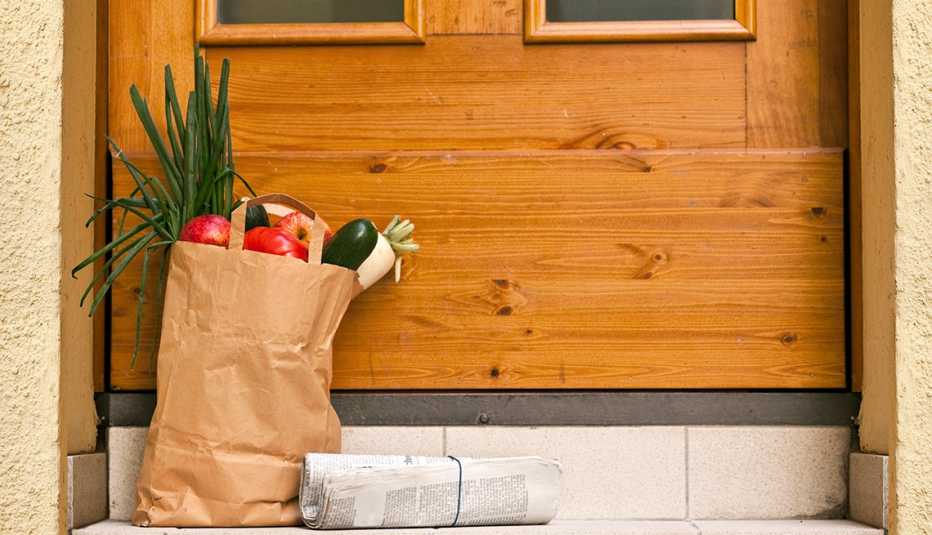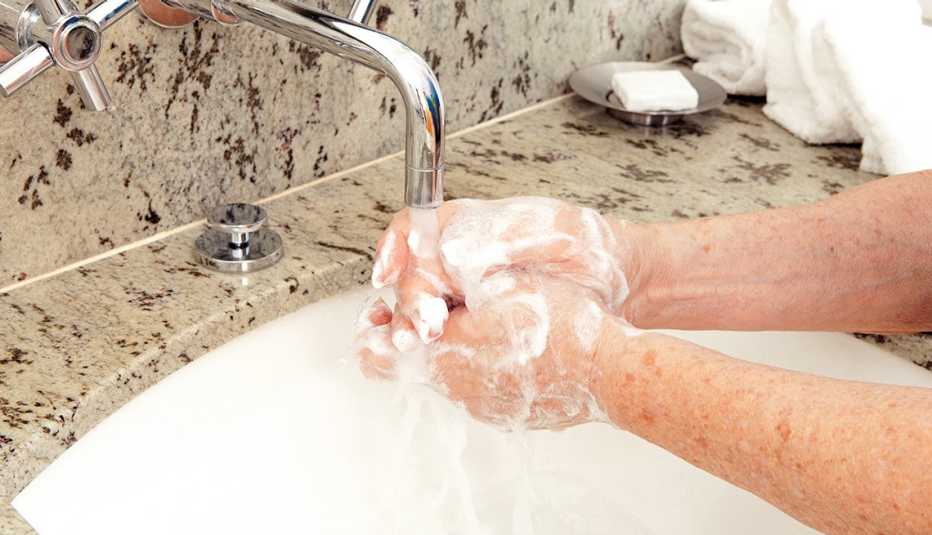AARP Hearing Center


With the news about coronavirus changing rapidly, it's difficult to know how to go about your daily routine. What was considered acceptable behavior — or even possible — three days ago may not be an option any longer.
As restrictions on public gatherings are announced and business closings continue, people need to weigh the risks of engaging in usual activities and make decisions for themselves as well as take into account their interactions with the public at large.
"Outside of your personal age and health status, it's important to think about the status of individuals with whom you may come in contact,” says Michael G. Knight, M.D., patient safety officer and assistant professor of medicine at George Washington University Medical Faculty Associates in Washington, D.C. While being around someone like a friend or coworker may (or may not) be fine for your health, he explains, that individual's unknown health status could have ill effects on an elderly family member you may need to assist or care for. “During this pandemic one should consider what activities are essential, versus what can be avoided."
More on Coronavirus


The Centers for Disease Control and Prevention has issued only broad guidelines and recommendations for protecting the public from coronavirus, such as avoiding groups of larger than 10 people and staying home if you're older. So we asked the country's top infectious disease experts to address more specific scenarios.
Scenario: Suffering from cabin fever, you want to meet a friend in public, but you're not sure where it's safe to go.
David Katz, M.D., a board-certified preventive medicine specialist and founding director of Yale University's Yale-Griffin Prevention Research Center: “All of our social interactions depend on whether you fall into the category of: if I get this infection, I'll probably be OK, or I need to avoid this infection at all costs, based on your age and health status. If it's the latter, you should limit your physical interactions to those you live with. If it's the former, it may be fine to meet a friend outside in the sunshine away from other people and put some distance between you. But recognize that if anyone has a fever or cough, you'll need to change your plans.”
Scenario: You want to check on an older family member but don't want to risk bringing them the virus. What's the best way to handle this?
Daniel J. Morgan, M.D., a professor of epidemiology and public health and infectious disease at the University of Maryland School of Medicine: “The number one thing is, if you have a cough, sore throat or runny nose, avoid going. If you're feeling well, it's OK to go, but be careful about washing your hands, and if you have a surgical mask, it wouldn't be unreasonable to wear it while seeing someone at higher risk. Keep in mind, the movement is toward closing nursing homes to outside visitors, because they're where we have the greatest worry about COVID-19 causing significant harm."
Knight: “The best way to check on an older family member is to call or video-call them on a smartphone. If you have to visit them in person for physical assistance or something else that cannot be done remotely, be sure to wash your hands thoroughly before interacting with them. If you're coughing, sneezing or having any respiratory symptoms, do not go to check on them. See if someone else can assist, or call local services to see if they can perform a welfare check.”
Scenario: You're tired of eating your own cooking. Can you go to a restaurant if it's still open, or can you order takeout from them?
Knight: “If you're craving a meal from your favorite restaurant, the safest option is to order delivery. The risk at a restaurant is not in the food but in the large number of people in close proximity to each other at the restaurant. The best way to avoid this risk is to order delivery and to wash your hands after handling the delivery materials, such as plastic or paper bags, menus, receipts, et cetera. Many delivery services now offer the option of having food left at a pick-up location or at your front door, which further limits your risk of coming in contact with someone with a COVID-19 infection.”
Scenario: You think you may have a sinus infection, but you're not sure if it's safe to go to the doctor to find out.
Morgan: “If you're not having symptoms like trouble breathing, call your doctor's office first and talk to someone about how you're feeling. We're trying to keep people from being exposed to coronavirus by coming in. With anything that doesn't seem urgent — whether it's abdominal pain or symptoms of a sinus infection — it's better to speak to your physician by phone or FaceTime.”
Katz: “Call your doctor's office and describe your symptoms over the phone. See if it's a matter that can be addressed over the phone or through telemedicine. I think we should do coronavirus testing away from medical centers, so people don't have to worry about going to the doctor, but that's not happening yet."
Scenario: You need to stock up on groceries and household items. What's the safest way to shop right now?
Morgan: “For those who have the means, having the products delivered is a good idea. If you need to go to a grocery store, wash your hands with soap and water or use a hand-sanitizing gel before and after, and be attentive to not touch your face while you're there. Try to avoid times when you think there will be crowds — first thing in the morning is when the environment is probably cleanest, and some of the virus may have died overnight. Late at night might be the second-best option if the store is unlikely to be crowded."
Katz: “Ideally, if you are in the at-risk group — you're over 70 or you have a chronic disease — you can rely on family members who are younger and have them do the shopping for you. Think about who are the more robust, healthy people who are least at risk for coronavirus; let them do this for you.”
Knight: “If you can't order online or have a neighbor or loved one shop for you and, therefore, must go to the grocery store, go during off-peak times, when there will not be a large crowd in the store. Keep your distance from other shoppers, avoid touching your face, and wash your hands thoroughly when you leave the store.”
Scenario: You're feeling lonely. Is it safe to have a small group of healthy friends over for dinner?
Neil Schachter, M.D., a professor of medicine at the Icahn School of Medicine at Mount Sinai in New York City and author of The Good Doctor's Guide to Colds & Flu: “I would postpone that if possible. You have to make a decision about whether the risk is worth the pleasure. If you are considered at increased risk by age or health issues or are in contact with people with these risk factors, you need to practice social distancing for at least two to four weeks — there should be no cheating. If you're going to have people over, have an appropriate distance — at least six feet — between yourselves. And don't invite anyone who has signs of a respiratory infection.”
Knight: “In general, I would not recommend that older people have friends over for dinner. The fact that people can become infected with COVID-19 and transmit it to other people days before developing symptoms makes it hard to determine who your ‘healthy friends’ are. If you're feeling lonely, your best option is to call a good friend on the phone or video-call some loved ones.”
Scenario: You've heard that many churches, mosques, and temples have closed and canceled services. Does that mean you should avoid any meetings or smaller volunteering activities with your place of worship?
Katz: “To make this decision, you need answers to these questions: Who's going to be there? Where have they been, and what has their exposure been? Have they been tested? And is everyone free of fever and cough? If you are frail, sick or vulnerable to infection, or your health is questionable and you're over 70, think twice about any social gatherings for several weeks. In any case, there should not be unknown people in the group.”
Scenario: If you have to go somewhere and you don't drive, is it better to take public transportation, or a taxi or driving service?
Schachter: “We're trying to discourage going places as much as possible. Taxi, Lyft or Uber would be better than a subway or train that would take you into a station where there are lots of people, not to mention the crowd of people in the subway car. If you're going into a private car, have hand sanitizer or a wipe to sanitize your hands after you get in and after you get out."
Knight: “If you must go somewhere, I recommend a taxi or driving service. Try to avoid touching common surfaces and touching your face during the ride. Be sure to wash your hands or use hand sanitizer when you leave the vehicle. I would recommend avoiding public transportation due to the large number of people in close proximity and high probability of coming in contact with contaminated surfaces.”

































































More on Health
Lessons From the Pandemic
What's changed, and what hasn't, since COVID-19 arrived